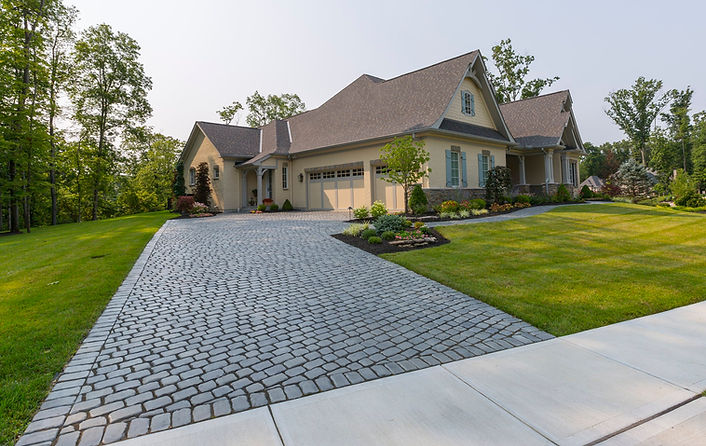📞 604-369-9770
📧 Or Email Us at info@landviewbclandscaping.ca

Paver Driveways in Coquitlam &
Surrounding Areas - LANDVIEWBC
A beautifully designed driveway sets the tone for your entire property. We specialize in building durable and stylish paver driveways in Coquitlam, Langley, Vancouver, and surrounding Areas. Whether you’re upgrading an old driveway or starting fresh, our expert team combines quality materials with professional craftsmanship to deliver lasting results.
At LandviewBC Landscaping Ltd., we build high-quality paver driveways that boost curb appeal and stand the test of time — from classic patterns to modern designs, tailored to your space.
Vancouver | Burnaby | Coquitlam | Surrey | White Rock | Abbotsford | West Vancouver | North Vancouver | Maple Ridge | Pitt Meadows | New Westminster | Port Coquitlam — and surrounding areas.

" Prep is everything "
Top 7 Things to Know About a Paving-Stone Driveway (and How to Avoid Costly Mistakes)
1. Proper Excavation Depth Is Critical
A paving-stone driveway isn’t just stones on dirt.
You need 4–6 inches ( sometimes up to 12, if the soil is weak ) of total excavation to allow for base, bedding sand, and pavers.
Too shallow = sinking, rutting, and frost movement within 1–2 winters.
Avoid the mistake: Never settle for anything less than proper depth, especially in rainy or clay-heavy soil.
2. Use the Right Base Material (and Enough of It)
Your driveway’s strength comes from the base, not the stones.
Use 3/4" crushed gravel (road base) compacted in 3–4 inch lifts.
Typical driveway base: 6–8 inches minimum, more if soil is weak.
Avoid the mistake: Don’t use round rock or recycled concrete as your main base material—they don’t lock together properly.
3. Proper Compaction Makes or Breaks the Job
Even expensive pavers will fail with poor compaction.
Every layer—subsoil, base gravel, and bedding sand—should be machine-compacted with a plate compactor.
Avoid the mistake: Never compact more than 3–4 inches at a time. Thick lifts don’t compact evenly and cause sinking later.
4. Good Drainage Prevents Heaving and Frost Damage
Water is the enemy.
Your driveway needs the correct slope (2% minimum) directing water away from the house.
Avoid the mistake: Avoid flat driveways. Without slope, water will pool under the stones, freeze, and lift sections.
5. Edge Restraints Are Required (Not Optional)
Paver driveways spread over time unless edges are locked in place.
Use:
-
Concrete edge restraints, or
-
PVC edge restraints with spikes
Avoid the mistake: Skipping edges will cause the driveway to spread apart and open gaps within 1–2 years.
6. Choose the Right Paver Pattern for Vehicle Traffic
Driveway pavers must handle weight, so patterns matter.
Best patterns:
-
Herringbone (most durable)
-
45° herringbone for maximum strength
Worst pattern for driveways:
-
Running bond (long straight lines) — it shifts under weight.
Avoid the mistake: Don’t choose a weak pattern just for looks.
7. Don’t Forget Joint Sand and Sealing
After installation, polymeric sand locks the pavers together and prevents weeds.
Sealing is optional but recommended for:
-
Stain protection
-
Colour enhancement
-
Longer life for your driveway
Avoid the mistake: Avoid cheap sand. Use high-quality polymeric sand and let it cure properly before driving on it.

Experienced Team
Our skilled team at LandviewBC landscaping ltd. is dedicated to delivering top-notch pavingstone driveway solutions tailored to your needs. Trust us for quality results.

Custom Designs
Create a unique entrance with our custom pavingstone driveway designs. We work closely with you to bring your vision to life and exceed your expectations.

Durability Guaranteed
Count on LandviewBC landscaping ltd. for durable pavingstone driveways that withstand the test of time and enhance the beauty of your property for years to come.
Why Choose LandviewBC Landscaping Ltd. for Driveways?
When it comes to building or upgrading your driveway, you need a team that combines experience, quality, and reliability. At LandviewBC Landscaping Ltd., we are recognized as trusted driveway contractors in Vancouver, Coquitlam, and Langley, helping homeowners and businesses get durable and attractive surfaces.
Our crew specializes in asphalt, concrete, and paver driveways, ensuring you get the right solution for your property’s style and budget. From smooth asphalt paving to decorative concrete and long-lasting stone pavers, we bring expertise to every project.
We pride ourselves on delivering affordable, reliable, and professional results. With clear communication, attention to detail, and commitment to timelines, our driveways not only enhance curb appeal but also stand strong for years to come.

Materials & Styles We Offer
we offer a wide selection of high-quality materials and styles to match your property’s design and budget. Our concrete pavers and exposed concrete driveways are popular in Coquitlam and Port Coquitlam for their strength and modern appeal. For a more classic look, we provide natural stone pavers that add timeless beauty and durability.
Homeowners looking for traditional charm often choose brick pavers, while our interlocking pavers deliver both strength and flexibility—perfect for driveways that need to withstand heavy use without losing their shape. No matter which material you choose, our team ensures a professional installation that boosts curb appeal and long-term value.
.jpg)

Benefits of Paver Driveways in Landscaping:

01
Durability:
Paver driveways are highly durable and can withstand the weight of vehicles and heavy traffic without cracking or breaking. They are resistant to the elements, including freeze-thaw cycles, which can cause damage to traditional concrete or asphalt driveways.
03
Low Maintenance:
Pavers require minimal upkeep compared to asphalt or concrete. If a paver becomes cracked or damaged, it can be easily replaced without needing to redo the entire driveway.
02
Customization:
The ability to mix and match different paver styles and patterns allows homeowners to create a completely unique look. Whether you prefer a sleek modern design, a classic brick pattern, or a rustic stone look, pavers can be tailored to fit your aesthetic
preferences.
04
Sustainability:
Because paver driveways promote better water drainage and reduce runoff, they are considered an eco-friendly option compared to traditional impermeable materials like asphalt.